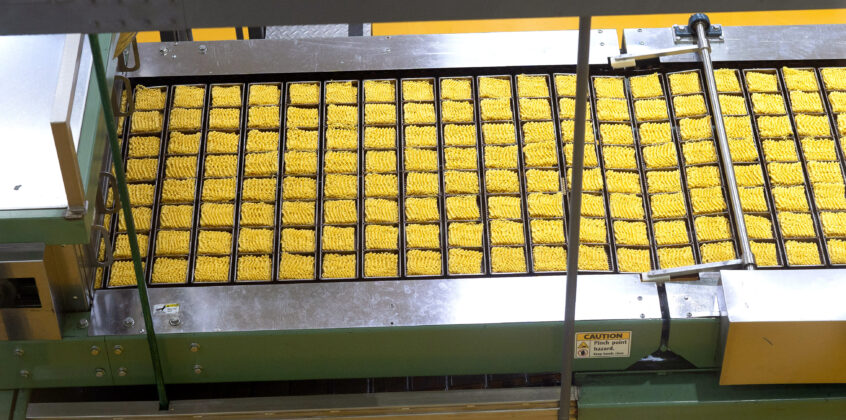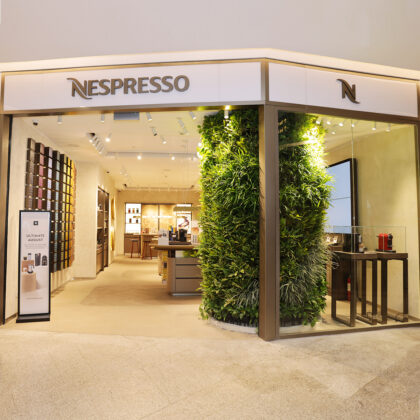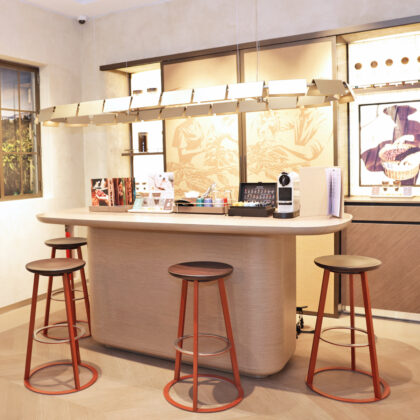Crystal Dragon highlights Mid-Autumn Festival menu
THE CITY of Dreams Manila ushers in the Mid-Autumn Festival on Sept. 10 with an auspicious a la carte menu at Crystal Dragon, the integrated resort’s award-winning restaurant known for its Cantonese and regional Chinese specialties. Exclusively available until Sept. 10, the menu consists of: Crispy dried scallop with crab meat and snow egg yolk; Double-boiled herbal chicken soup, sea cucumber, black garlic and cordyceps flower; Roasted duck meat with Grand Marnier herb reduction; Golden crispy crab claw coated with potato noodles; and, Crispy wasabi prawns with toasted sesame and slow roasted almond nuts. As eating mooncakes, the symbol of the holiday signifying togetherness and harmony, is a not-to-be-missed tradition, Crystal Dragon offers the pastry as part of a dessert trio: Homemade coconut pandan mooncake, Crispy avocado kataifi roll with fragrant mango, and Pomelo with sago pearls for dessert. For inquiries and reservations, call 8800-8080 or e-mail guestservices@cod-manila.com. For more information, visit www.cityofdreamsmanila.com.
Kenny Rogers Roasters and Beyond Meat join forces
PLANT-based products and proteins are given a new spin as Kenny Rogers Roasters introduces new hearty and healthy dishes, thanks to its partnership with Beyond Meat, a brand that offers plant-based “meat.” First launched in July 2021, Kenny Rogers Roasters’ plant-based menu is growing with the addition of Kenny’s Beyond Basil Bowl (P270), a savory umami Beyond Meat plant-based protein mixed with sweet basil and a hint of chili served over rice, and Kenny’s Beyond Bolognese. Kenny’s Beyond Basil Bowl (P220), al dente spaghetti noodles tossed in a rich and savory tomato sauce and Beyond Meat plant-based protein. Already on the menu is the best-selling Kenny’s Beyond Burger (P295), a classic quarter pound burger with lettuce, tomato, cheese and mayo sandwiched in between soft wheat buns, which is made with Beyond Meat plant-based burger patties. These dishes are available in all Kenny Rogers Roasters stores nationwide for a limited time only, via dine-in, takeout, or delivery through www.kennyrogersdelivery.com.ph, hotline: 8-555-9000, or via Grab Food and Food Panda.
Grandparents get a treat from Mang Inasal
MANG Inasal celebrates Grandparent’s Day from Sept. 5 to 11 at Mang Inasal stores nationwide. Dine-in customers can treat grandparents to either two small Extra Creamy Halo-Halos or two Palabok solos for P99 per order, saving P31 savings in this dine-in only promo.
Panda Express marks dish’s anniversary with deals, promos
PANDA Express’ Original Orange Chicken is celebrating its 35th anniversary this year, and the restaurant chain is marking the occasion with special deals and other surprises on dine-in, web app, and delivery purchases until Sept. 30. The Original Orange Chicken is Panda’s most popular dish and represents about a third of the entire business. In 2021, Panda Express served over 117 million pounds of Orange Chicken worldwide. Until Sept. 30, dine-in guests may enjoy P35 off coupons for their Original Orange Chicken bowl, plate, and bigger plate orders. For those who are using the web app to purchase their Panda favorites, there will be a free medium pail of Orange Chicken on a minimum order value of P750. For more information about the offers, visit order.pandaexpress.com.ph; offers cannot be combined with other promotions and discounts. Meanwhile, take P135 off on Original Orange Chicken large ala carte orders via GrabFood available until Sept. 30. Panda Express has 11 stores in Metro Manila that are open for dine-in, take-out, and delivery through order.pandaexpress.com.ph, GrabFood, and foodpanda. Delivery locations include select areas in Manila, Pasay, Makati, and Quezon City. These stores are located in Don Antonio, Quezon City; SM Megamall; SM North EDSA; SM Grand Central; SM Southmall; Robinsons Place Manila; Shell SLT, SLEX Southbound; Double Dragon Meridian Park; SM Mall of Asia; Greenmeadows and Betterliving, Parañaque.
New Heineken Silver hits shelves this month
HEINEKEN has launched its latest brewing innovation, Heineken Silver, a smooth, easy to drink and accessible tasting beer. Now available at leading retail outlets and dining and entertainment establishments, Heineken Silver is brewed by seasoned master brewers using simple, natural ingredients, including Heineken’s A-yeast and quality pure malt, as well as sustainably sourced barley that supports Heineken’s wider commitments to “Brew a Better World.” Heineken Silver is available for purchase for 18 years old and up in both on and off-trade retail channels. It comes in 330ml cans and bottles as well as 500ml cans.
Nespresso opens shop at One Bonifacio High Street
NESPRESSO has opened a boutique at One Bonifacio High Street mall in BGC, Taguig. It features an immersive space that will help patrons better understand the brand and its offerings. The boutique boasts locally inspired designs including a seagrass wall mural to give guests a Pearl of the Orient feel. The boutique’s seagrass wall art is made by Rolyolikha at iba pa Handicrafts, a social enterprise that creates a sustainable, feasible, and viable livelihood for communities. The boutique has a window-to-farm feature that gives a virtual view of coffee farms with the aim of bringing customers closer to the natural origin of the coffee, and a greenery wall that symbolizes the local coffee plantations where the coffee beans are sustainably sourced. There is also an Atelier table where a coffee specialist will answer all Nespresso coffee-related questions, explaining the specifics of Nespresso’s coffee selections, and providing recommendations to help guests find the perfect coffee that suits their palate. The brand further solidifies its commitment to sustainable business practices by incorporating a recycling corner at the shop, encouraging patrons to drop off their used Nespresso aluminum capsules at the store to be repurposed later on into common household items. A new element that patrons can look forward to at the fourth boutique is the AAA dashboard, a new feature from Nespresso which shows the company’s sustainability program all over the world. The boutique is open from 11 a.m. to 9 p.m. Follow @nespresso.ph on Instagram and @nespresso.phl on Facebook for updates, or visit www.nespresso.ph.
Goldilocks offers back to school promo
GOLDILOCKS bakeshop has a back-to-school promo with the new Goldilocks Bitbit Packs. Get bigger savings by buying a bag of Fluffy Mamon, Assorted Cake Slices and Cheesy Ensaymada. A six-pack of Fluffy Mamon is available for P140, a six-pack of Assorted Cake Slices for P160, and a six-pack of Cheesy Ensaymada for P170 until Sept. 20.
7-Eleven brings back running event
AFTER two years of running virtually, the 7-Eleven Run Series is finally back on the road. The convenience store is bringing its 10th installment and 5th simultaneous event in Manila, Cebu, and Davao. To celebrate the comeback of the two-day physical event from Sept. 24 to 25, 7-Eleven is preparing cash prizes, major freebies from sponsor brands, and a chance to run in an international competition. There are nine distance categories to choose from: 3KM, 5KM, 5KM Buddy, 10KM, 10KM Buddy, 16KM, 21KM, 32KM, and 42KM, with medals and cash prizes ranging from P2,000 to P25,000. The top three male and female Filipino winners in the 21KM, 32KM, and 42KM races will get a chance to represent the country in an international marathon competition. Participants can do a quick grocery run with the amount of freebies they can grab from over 30 sampling booths courtesy of 7-Eleven’s brand partners. On the two-day simultaneous event, (in Filinvest, Alabang for the Manila leg, Cebu Business Park, Ayala Center for the Cebu leg, and SM City Davao Ecoland, Davao City for the Davao leg) partner brands will offer snacks, drinks, daily essentials, and more for free. Participants can register to join by collecting 15 e-stamps through the CLiQQ App to redeem one registration code for their chosen category; 30 e-stamps are required to redeem a registration code for each buddy run category. A P100 minimum purchase of participating items is needed to get one (1) e-stamp. This also entitles the customer to one e-raffle entry per e-stamp, for a chance to be one of the 3,000 winners of products from the run’s major sponsors. Participants can also opt to register by paying the corresponding fee per run category starting at P500 each. Once paid or the required number of e-stamps are collected, the participant can claim their Race Kit at the nearest 7-Eleven store. Registration is until Sept.13 only. Go to the nearest 7-Eleven store or register online at www.run711.com to join.
Landers Superstore opens UP Town Center branch
MEMBERSHIP shopping store Landers Superstore has opened its 7th branch in UP Town Center, along Katipunan Ave., Quezon City, making it the first Landers Superstore in an Ayala Mall. Landers’ 7th store offers members the convenience of shopping within a mall setting, complemented by Instagrammable interiors, an expansive retail area, a relaxing dining space, and a vast array of imported and local merchandise that include exclusive products and in-house food specialties. Members may also enjoy food options from Landers Central and Doppio, as well as low-priced medicines from Capital Care Pharmacy, and free haircut or blow dry from Federal Barbers. Shoppers also get exclusive fuel discounts at any Landers Caltex Gas Station when they sign up for a Landers membership. Landers UP Town Center is at Phase 1B UP Town Center, Katipunan Avenue, UP Campus, Quezon City. For more information, visit the Landers Superstore Facebook Page.


























